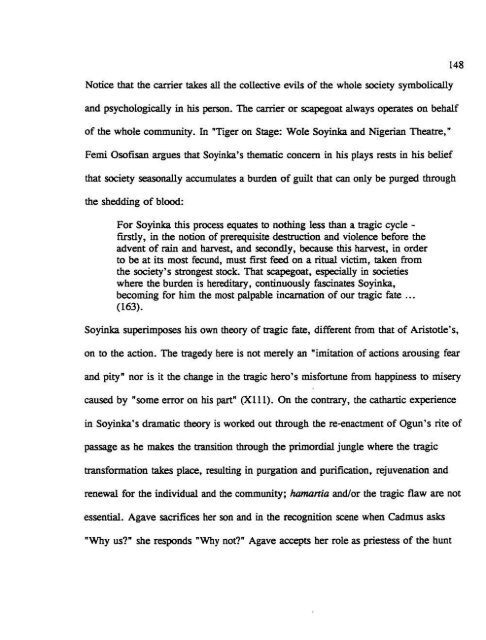Untitled - Memorial University of Newfoundland
Untitled - Memorial University of Newfoundland
Untitled - Memorial University of Newfoundland
Create successful ePaper yourself
Turn your PDF publications into a flip-book with our unique Google optimized e-Paper software.
Notice that the carrier takes all the collective evils <strong>of</strong> the whole society symbolically<br />
and psychologically in his person . The carrier or scapegoat always operates on behalf<br />
<strong>of</strong> the whole community. In "Tiger on Stage: Wole Soyinka and Nigerian Theatre,"<br />
Femi Os<strong>of</strong>isan argues that Soyinka's thematic concern in his plays rests in his belief<br />
that society seasonally accumulates a burden<strong>of</strong> guilt that can only be purged through<br />
the shedding <strong>of</strong> blood:<br />
For Soyinka this process equates to nothing less than a tragic cycle <br />
firstly . in the notion <strong>of</strong> prerequisite destruction and violence before the<br />
advent <strong>of</strong> rain and harvest. and secondly. because this harvest, in order<br />
to be at its most fecund, must first feed on a ritual victim. taken from<br />
the society's strongest stock. That scapegoat, especially in societies<br />
where the burden is hereditary , continuously fascinates Scyinka,<br />
becoming for him the most palpable incarnation <strong>of</strong> our tragic fate .. .<br />
(163) .<br />
Soyinka superimposes iris own theory <strong>of</strong> tragic fate. different from that <strong>of</strong> Aristotle's.<br />
on to the action. The tragedy here is not merely an "imitation <strong>of</strong> actions arousing fear<br />
and pity" nor is it the change in the tragic hero's misfortune from happiness to misery<br />
caused by "some error on his part" (XU I) . On the contrary, the cathartic experience<br />
in Soyinka's dramatic theory is worked out through the re-enactment <strong>of</strong> Ogun's rite <strong>of</strong><br />
passage as he makes the transition through the primordial jungle where the tragic<br />
transformation takes place, resulting in purgation and purification. rejuvenation and<br />
renewal for the individual and the community; hamartia and/or the tragic flaw are not<br />
essential. Agave sacrifices her son and in the recognition scene when Cadmus asks<br />
"why us?- she responds "why not?- Agave accepts her role as priestess <strong>of</strong> the hunt<br />
148

















